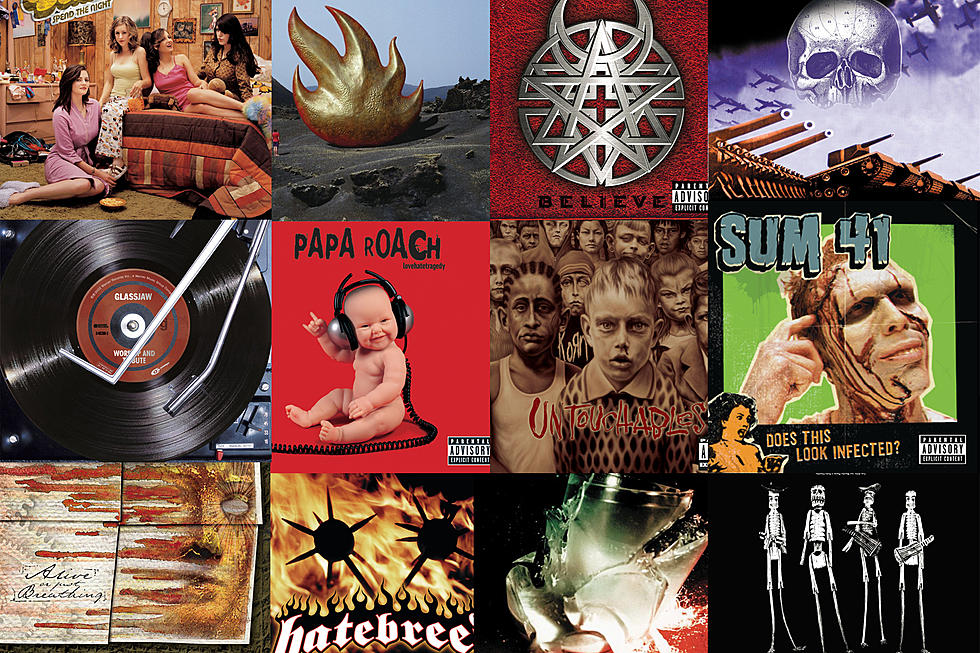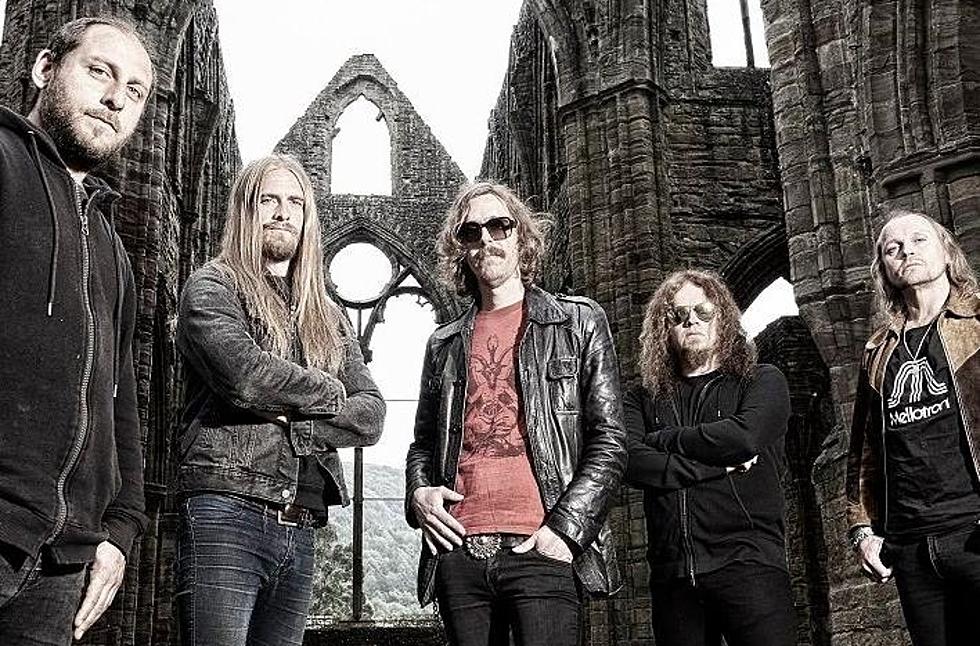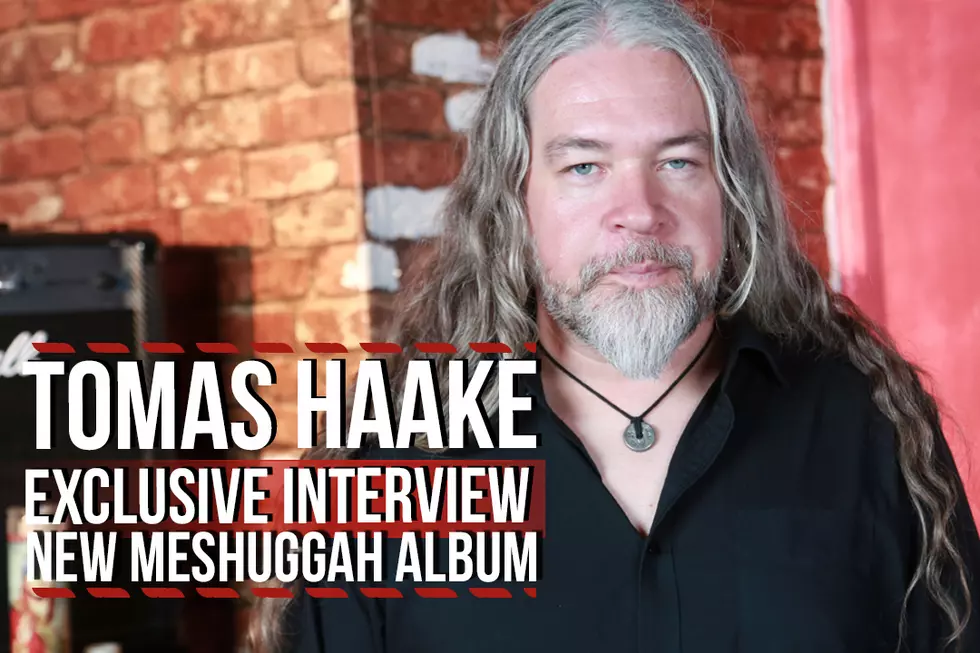
Meshuggah’s Tomas Haake Talks New Album, Role as Lyricist, Time Away From Music + More
Meshuggah drummer and lyricist Tomas Haake was the guest on Full Metal Jackie's weekend radio program. He discussed the band's new record, 'The Violent Sleep of Reason,' getting into the inspiration behind the album title and his lyrics as well as why it takes the band roughly four years to release a new record. Haake also reflected on Meshuggah's nearly three decade career and more. Check out the chat below.
How ya doin?
Hey Jackie, how's it going?
We've got this new Meshuggah album, it's called The Violent Sleep of Reason and a Meshuggah album takes a long time to do.
Yeah, so it would seem. Yeah, every four years pretty much on the dot. I would say over the last, you know, like three or four releases, or so. It does take us quite some to write and we're one of those bands, we never wrote a single riff or a part, I think, on a tour bus or in a hotel room. That's just a way of working that just never worked for us. We always have to kind of take time out and have like at least six months and a best case scenario like a year to just focus on writing for us to actually kind of get going on things. So, yeah, that's one of the reasons.
How do you get into the mindset? Your music is thinking man's metal, right?
[laughs]. I don't know, man. That's something that's just that's kind of, I don't think you notice that yourself. You just kind of get into that mode. There's no, like, certain ritual or anything that we go through to kind of put us ourselves there. It's just, usually we will all have our ideas already, like things we want to do, like kind of stacked in our minds, and once you take that time out and you kind of sit down and start really trying to work on things, that's like the first pit that you start poking, you know, to kind of get those ideas out there. And that's kind of starting point for any kind of record writing process for us.
Drummers typically aren't lyricists. How do you approach writing lyrics differently than a singer?
I would say this is kind of maybe because it’s so inherent in the music being technical and in some ways, also the lyrics and the vocals of the band also has like it's own percussive element. And, is, in a sense, it it's own instrument in the band more than vocalists singing on top of something, you know? It's a very integral part of both the song, the structures of the song and even the patterns of parts. So for that reason, that's one of the reasons that actually works for me as a drummer to do that.
Inspired definitely — I never thought of it when I was a kid, like Rush, Neil Peart, he was the first one I kind of noticed that he was writing the lyrics for the songs. And was really weird to me when I was like growing up. He writes the song, he writes the lyrics for the songs. It's kind of odd, but that was also kind of an eye-opener that it doesn't have to be, you know, the singer that does this or the drummer does that. And the same thing goes for other things in our band. I mean, a lot of times the guitarists will write the drum parts for the song and usually I don't change that. They’re very kind of particular on how they want their stuff to be played. That's kind of what I adhere to, so it kind of goes both ways.
So it must be good to have people in your band who can all play their instruments.
Yeah, definitely. It's a great help. Yeah, but now we're so used to all of us we're so used to like programming drums and stuff for demos. And it's a quick way for us to work. It's something we've been doing for so long everyone is kind of really clicking and good with those things.
Tell us, what kind of daily routine do you follow to be at your best to play such complex music every night?
Oh, I wish I had a daily routine like that because, actually, for me, whenever we have some time off, that also means I try to have time off from the drums, from music, from the band. Otherwise, the better part of every year, it's so much a focus of everyone in the band. Not just to write and record and tour, but there's also the aspect of the company and doing bookkeeping and planning a lot.
Nowadays, everything’s so mapped out and kind of planned out and it's all sorts of things you have to consider and think about like stage art. You know, it's just very many aspects of it that when I do have some time off I try to kind of go into the woods and fish or do something where I can actually kind of disconnect from that, so.
Do you fish? Are you a woodsy outdoors kind of guy?
I do. Well, I don't really camp so much. I prefer a cabin, but yeah. I'm finding that if there's no reception or no power, that's fine. Yeah, you don't need that. Yeah.
Like candlelight, lantern, Swedish fishing and camping trip.
Yes. That's how we grow hair on our bellies.
You just released a very comprehensive box set. What was the most interesting thing about looking back at your career while putting it together?
You tend to kind of forget the fact that by now, when we're talking this is 27 years into the career of the band. That in it of itself is mind blowing. With this kind of style of music that we play and always have played, I don’t think we'd ever thought we'd be here today and live off of this, which is still, to be honest kind of a narrow niche of music. With that said, I will say, what was the question?
[laughs] What was the most interesting thing about looking back at your career while putting it together?
Really realizing how old we got. You look at the first album and think 'Holy s--t, look at those kids!' Those were little kids there, all naive trying to cram a thousand different riffs into every song. But it's fun to see the evolution of the band, if you listen back to the first release compared to where we are now, obviously spanning over 25 years there's going to be a difference. Some bands start out playing rock 'n' roll, we've kind of played the same music 25 years later. I think for us, at least for me, the change has been drastic if you really jump from 25 years ago until now.
Talking about the art, how did Francisco Goya's art specifically influence the new album?
Not really at all. It influenced the title, it had no impact on the art for our album but the Francisco Goya painting, the sleep of reason produces monsters was as you can hear, it's kind of similar to The Violent Sleep of Reason. So, that was just the inspiration of how you would use wording like that. Even though it's not immediately recognized for what we're thinking. What is the violent sleep of reason? It's still something that was just inspired by that painting in the wording sense. But then when it come to our artwork, that has nothing to do with the original.
What did you think of Rishabh Seen covering a Meshuggah song entirely on sitar?
It's not the first time we've seen over the years very different musicians from very different cultures do their take on our music. That's really cool and humbling in a sense. Even with this quirky kind of metal we play, we've been able to reach out into parts of the world where you didn't necessarily think this music would reach. In that sense, it's very cool.
Are you looking forward to touring back in the States?
Oh, absolutely. That's always a treat for us. Since Slayer actually — they helped us get on the map in the U.S. in 1999 where we opened for them for like seven weeks. That was kind of where we started getting some footing here. By now, and for the last 10 years at least, it's kind of been a main market for us. A lot of Americans and fans we've talked to over the years seem to think that we're huge in Europe and we play arenas in Europe which is not the case.
We're actually bigger in the States than we are in Europe. I don’t know why that is, the U.S. has always been good with really progressive and different bands. Rush, for example, were always super huge in Canada and in the States but they weren't that big in Europe. It took them far into their careers before they were an arena band on the other side of the Atlantic. I don’t know, for some reason Americans have embraced complex and progressive music in a different way compared to European mainland for example.
Why do you think that is?
I have no idea. Germans are like the Japanese, they like their music melodic. Like, power metal a lot of melody whereas our music is more based on rhythms and rhythmic structures more so than a melodic standpoint. Even though there's melody in there, we come from a different angle. For some reason, it seems like it doesn't work in some regions, it's not their cup of tea so to speak.
What are your plans beyond the U.S. tour?
Nowadays, if you look back five or further, 10 years ago there wasn't much planning going on. Now everything is planned out a year and a half in advance. We kind of know where we're going to be next year and what kind of tours we're doing, so we start off the first tour here in the U.S. and we try to do that with every release because of what we said earlier, it's a main market for us. We go home for like a few weeks and then do the same thing, similar length run in Europe. Then in early 2017 we go to the U.K. and then Australia, New Zealand, etc. There's a lot planned.
Thanks to Tomas Haake for the interview. Grab your copy of Meshuggah's 'The Violent Sleep of Reason' at Amazon or digitally through iTunes. The band's North American tour with High on Fire is underway and a list of dates can be found at their Facebook page. Find out where you can hear Full Metal Jackie’s weekend show at this location.
See Where Tomas Haake Ranks Among the Top 66 Hard Rock + Metal Drummers of All Time
Tomas Haake Plays 'Wikipedia: Fact or Fiction?'
More From Classic Rock 105.1










